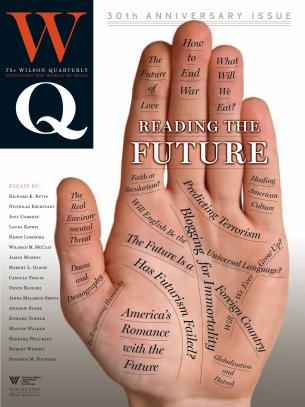Reading the Future


The reputation of government elites, which once formed the backbone of public service both in America and abroad, has fallen in recent years, and that may not be a good thing.
Politicians love to play the bipartisan card, but there's always something political at stake.
The popular view was always that FDR's ill-advised 1937 court-packing scheme nonetheless nudged the Supreme Court justices to alter their thinking on the New Deal, but change may already have been happening.
A military strategist believes major reforms are needed at the United Nations.
Does corporate giving help companies' bottom line? The real benefits remain elusive, as does the future of business charity.
The roots of the problems in America's corporate world may lie in their ownership structure, very different from the norm in the rest of the world.
Why is corruption so pervasive around the globe?
Why the smiley face should be America's national symbol.
Los Angeles has a long and sordid history of murder, a pattern that will likely be difficult to break.
Could a shift to the smaller format be the salvation for today's troubled American newspapers--or newsprint's last gasp?
_img_0.jpg"/> At bottom, Brinkley and lier. Two weeks later, he joined Kalman observe, this is a in a 5–4 ruling upholding a debate about how the major New Deal measure, the Supreme Court changes its National Labor Relations Act. mind. Is the Court (and the The "switch in time [that] law more generally) a creature saved nine," as a wit of the day of politics, as legal realists and put it, removed the Court as other thinkers of progressive an obstacle to New Deal legis bent have argu...
IN ESSENCE
IN ESSENCE
The Catholic Church has said that intelligent design is a scientific question, beyond the capacity of theology to answer.
IN ESSENCE
IN ESSENCE
IN ESSENCE
IN ESSENCE
IN ESSENCE
IN ESSENCE
IN ESSENCE
IN ESSENCE
IN ESSENCE
IN ESSENCE
Martin Walker on Britain's high point
Terry McDermott on the roots of terrorism
James B. Twitchell on a man who sold America the goods
Alex Beam on the character of New England
James Morris on one of America's most significant waterways
A MAN WITH
NO TALENTS:
Memoirs of a Tokyo Day Laborer.
By Oyama Shiro. Translated by Edward Fowler.
Cornell Univ. Press.
139 pp. $21
Ann J. Loftin on a prickly playwright
Brian Hall on T. S. Eliot's poetry and love life
THE FUTURE WITHOUT A PAST:
The Humanities
in a Technological Society.
By John Paul Russo.
Univ. of Missouri Press. 313 pp. $39.95
CHINA’S RISE
IN ASIA:
Promises and Perils.
By Robert G. Sutter.
Rowman & Littlefield. 297 pp. $24.95
PROTECTING LIBERTY IN AN AGE OF TERROR.
By Philip B. Heymann and Juliette N. Kayyem.
MIT Press. 194 pp. $30
ON THE ICE:
An Intimate Portrait of Life at McMurdo Station, Antarctica.
By Gretchen Legler. Milkweed Editions.
195 pp. $15.95
THE CUTTER
INCIDENT:
How America’s First Polio Vaccine Led
to the Growing Vaccine Crisis.
By Paul A. Offit.
Yale Univ Press.
238 pp. $27.50
CURT RICHTER:
A Life in the
Laboratory.
By Jay Schulkin.
Johns Hopkins Univ. Press. 187 pp. $49.95
James Gilbert on an illusory Utopia
THE LIFE OF DAVID.
By Robert Pinsky.
Schocken. 209 pp. $19.95
THE PRISON ANGEL:
Mother Antonia’s Journey From
Beverly Hills
to a Life of Service in a Mexican Jail.
By Mary Jordan and Kevin Sullivan.
Penguin. 237 pp. $24.95
T. S. ELIOT: The Making of an American Poet, 1888-1922. By James E. Miller Jr. Pennsylvania State Univ. preG.468 pp. $39.95
The effort to think systematically about the future began little more than a half-century ago, and the results so far have not been impressive. Today’s futurists hope that more sophisticated methods will allow them to provide a better picture of what tomorrow may bring.
The celebrated American faith in the future was matched in the past by a willingness to sacrifice for a better tomorrow. Today, the faith endures but the commitment to sacrifice is in doubt.
Decades ago, many population statistics seemed to point toward global calamity. Today, the world’s population is indeed much larger—but it is also much healthier, better educated, and richer. Therein lies a lesson in the use and misuse of numbers.
Will better intelligence and technology allow the United States to anticipate future terrorist attacks? History does not offer much reason for optimism, but there are steps we can take now.
Nearly anyone today can inscribe his name for eternity on the Web or have it chiseled in brick at his alma mater. Has the 21st century finally delivered immortality for all?
How we choose to think about what lies ahead may be more important in creating a future we can comfortably inhabit than all the technological change tomorrow will bring.
The next 30 years may represent a watershed in human affairs.
An attack on global warming is not the smartest way to improve the lot of the world's poor.
America has become the land of the 30-year-old adolescent.
It's hard to believe that Tang once looked like the future of American food.